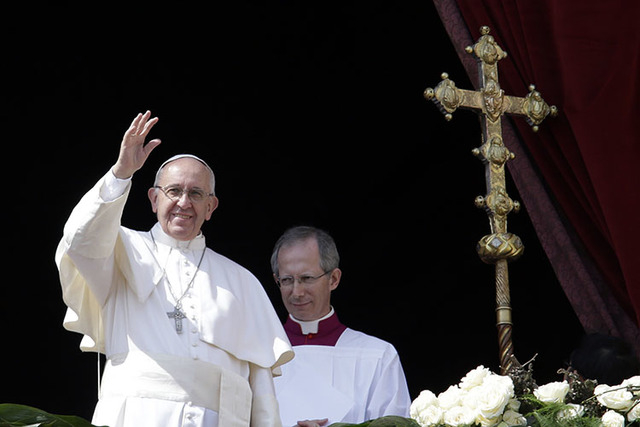Nevada priests react favorably to Pope Francis’ family proclamation
Although none had the chance to read it yet, Southern Nevada priests said Friday that they hoped a proclamation released by Pope Francis might encourage the church to treat parishioners in a less judgmental, more pastoral way when it comes to issues involving marriage and family life.
In the 256-page document, “The Joy of Love,” Pope Francis addresses several issues including same-sex marriage, contraception and even domestic violence. Also examined is the particularly divisive issue of whether Catholics who divorce and remarry may receive Holy Eucharist, the central sacrament of Catholic church life.
The church’s stance was, and continues to be, that those who divorce and remarry may not receive Communion unless they have received an annulment, a formal decree by the church that a valid marriage never existed.
However, the pope last year eased the process required to obtain annulments and, in Friday’s document, seemed to question the notion that across-the-board, hard-and-fast responses are necessarily the proper ones in ministering to divorced and remarried couples.
“By thinking that everything is black and white, we sometimes close off the way of grace and of growth and discourage paths of sanctification which give glory to God,” he wrote. “Let us remember that a small step in the midst of great human limitations can be more pleasing to God than a life which appears outwardly in order but moves through the day without confronting great difficulties.”
The Rev. Gerald Grupczynski, pastor of Our Lady of Las Vegas Roman Catholic Church, said Friday that issues involving marriage are “always the most difficult that come about.”
For a priest, he said, the challenge is that “we are called to be merciful and pastoral toward people, but, then, there are church laws that stand as they do and make it a little bit difficult to reconcile.”
The result is that divorced Catholics may feel closed off or excluded not only from taking Communion but from church life in general. Pope Francis, he said, “is trying to bridge that gap without bending the rules too much, and at least trying to make sure that people who are in that (situation) can approach the Eucharist and feel like they’re not outcasts.
“So, hopefully, in what he has written, that comes out and this is going to be the direction.”
Grupczynski said church law also can result in confusion among laymen about what is and isn’t permissible. Some divorced Catholics who never remarry and who would be permitted to take communion mistakenly believe that they can’t, while other divorced Catholics who do remarry “don’t realize it’s a problem or issue that comes up or needs to be faced,” he said.
So, Grupczynski said, “I welcome this from the Holy Father, that there is going to be some kind of pastoral approach.”
The Rev. Dave Casaleggio, pastor of St. Christopher Catholic Church, said he welcomes Pope Francis’ running theme in “The Joy of Love” of moving beyond legalistic structures alone in ministering to parishioners.
But, Casaleggio said, “it’s been (Pope Francis’) way to go from the beginning.”
Casaleggio said the church rightly believes that marriage is a sacrament, that it’s indissoluble and that a marriage never should be ended lightly. But, he said, “in my opinion, and I hope this is what the Pope is saying, I don’t know we need a totally legalized (annulment) system to be able to get that across.”
Donna Wilburn, a Las Vegas licensed marriage and family therapist who was raised, and still is, Catholic, said she does “a lot of work with Catholics in session,” and that Catholic clients often are concerned about how divorce might affect their church life.
“A lot of guilt can come up when a Catholic person is looking at their relationship and considering divorce,” she said. “It can influence them into staying in unhealthy relationships, because they feel guilt or they’re worried about the effect it might have on their (practice in) church.”
“I have folks that are afraid of how their family will react if they get a divorce,” Wilburn said. In some cases, it’s not even Catholic beliefs about divorce that are the problem, she said, but, rather, a family’s or cultural group’s interpretation of those Catholic beliefs.
“I have to tell you, also, that I have clients who have turned away from the church because of the judgment they felt, and after divorce stopped going to church because they felt judgment, even if it’s from inside themselves.”
Mary Colleen O’Callaghan-Miele, whose first marriage was annulled, said that the church already has moved in the direction Pope Francis seems to be suggesting, “especially here in Southern Nevada. I know they have evolved in eliminating the judgment of it and embracing the individual.”
Ultimately, Casaleggio said, the goal is “to bring them to Christ (in) the Eucharist,” and Pope Francis’ proclamation may start a conversation about how best to do that.
Read more from John Przybys at reviewjournal.com. Contact him at jprzybys@reviewjournal.com and follow @JJPrzybys on Twitter.
RELATED
Pope emphasizes flexibility over rules for modern families

















